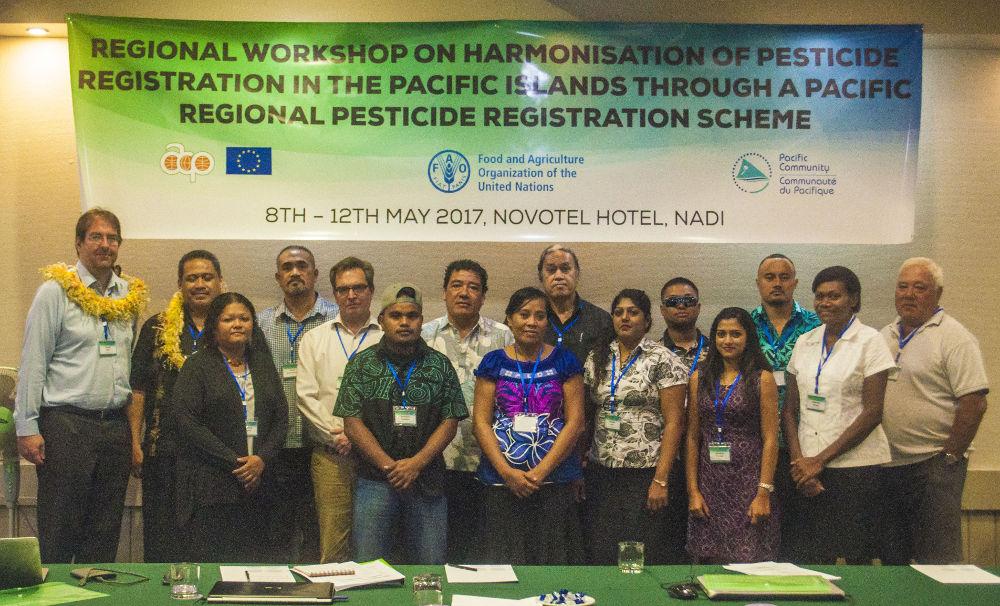Twelve Pacific Island Countries supported by the Pacific Community (SPC) have established a Pesticide Regulatory Forum which will serve as the primary platform for the harmonisation of pesticide registration and use in the Pacific. The forum will function as a technical support mechanism, to inform national decision making on pesticide registration.
This follows a Regional Workshop on the Harmonisation of Pesticide Registration in the Pacific Islands held in Nadi from 8 to 12 May by FAO and SPC. The workshop was attended by public sector representation from the Cook Islands, Federated States of Micronesia (FSM), Fiji, Kiribati, Marshall Islands, Niue, Palau, Papua New Guinea, Samoa, Solomon Islands, Tonga and Vanuatu.
The workshop was organised under the EU-funded project “Capacity Building related to Multilateral Environmental Agreements in African, Caribbean and Pacific (ACP) Countries Phase 2 (ACP/MEAs 2)”, the objective of which is to support and strengthen institutional and national capacity-building for the synergistic implementation of the target MEA clusters.
MEAs are the international treaties and conventions on the environment. They address environmental issues of global concern in such areas as climate change, biological diversity, sound management of harmful chemicals and hazardous wastes, and coastal and marine environment among others. They include binding instruments as the Basel, Rotterdam and Stockholm Conventions and the Convention on Biological Diversity as well as voluntary instruments as the FAO/WHO International Code of Conduct on Pesticide Management and the Strategic Approach to International Chemicals Management (SAICM) among others, providing a sound framework for pesticides and biodiversity management.
According to SPC Director Land Resources Division, Jan Helsen, “Pesticide use in agricultural production is inevitable. The green revolution, which focusses on food and income security in the region has not effectively highlighted the adverse impacts of pesticides on human health. There is sufficient evidence to support the dangers of poorly managed pesticide use, let alone the use of adulterated pesticides which then raises the question of responsibility for minimising threats to human health and the environment.”
“Strong working relationships and technical partnerships between agencies like FAO, SPC and its member countries are critical to share knowledge and best practices through mutual cooperation and having common understanding of, and insights into the use of pesticides,” Mr Helsen said.
The harmonisation of pesticide registration in the Pacific region is part of a coordinated effort between member countries, FAO and SPC leading to the formal establishment of the Pacific Regional Registration Scheme (PRPRS) in May 2015. The PRPRS was developed by National Pesticide Registrars working jointly on important steps of pesticide registration such as human health and environmental risk assessment, also the focus of a 2015 workshop held by FAO and SPC in the Pacific.
The PRPRS aims to strengthen capacity of Pacific countries to better determine which products are permitted to be used and for what purposes, and also to improve control over quality, use levels, claims, labelling, packaging and advertising of pesticides. Regional cooperation allows for pooling available expertise on pesticides to support information exchange amongst member countries and improve these decisions. PRPRS is thus an important instrument for reducing pesticide risks for human health and the environment of member countries.
Reiterating the significance of harmonised pesticides registration, Dr Viliami Fakava of UN FAO stated, “The importance of regional support mechanisms and regional cooperation in the Pacific islands cannot be over-stated. FAO fully supports the establishment of a regionally harmonised system that Pacific Island countries have committed to. Good risk assessment and sound pesticide registration systems are absolutely necessary in building resilience and in securing sustainable livelihoods for our communities.”
During the May 2017 workshop, participants agreed on using the FAO Pesticide Registration Toolkit to facilitate effective implementation of the Regional Scheme. The FAO Pesticide Registration Toolkit is a decision support system for pesticide registrars. It assists registrars in the evaluation and authorization of pesticides.
Registration staff can use the Toolkit to support several of their regular tasks, including: finding data requirements, evaluating technical aspects of the registration dossier, choosing an appropriate pesticide registration strategy and procedures, reviewing risk mitigation measures and getting advice on decision making.
The pesticides working group has developed a proposal for the PRPRS to serve as a mechanism to provide technical support to assist national authorities with pesticides registration decisions (strengthening pesticide legislation and policies), and a draft Memorandum of Understanding (MoU) based on the agreed structure and design of the regional scheme with the anticipation of a likely transition to a binding regional agreement or treaty, with SPC as the proposed depositary.
A draft paper on the PRPRS and associated MoU has been prepared for endorsement by Pacific Ministers of Agriculture later this year at the Ministers of Agriculture and Forestry Meeting (MOAFs).
Media contacts
Salome Tukuafu, SPC Information and Communications Management Officer, [email protected]
For technical information relating to the workshop
Renuma Kumar, SPC Plant Health Technical Assistant, [email protected] OR +676 8610463
Useful link
FAO website - Pesticide registration toolkit
